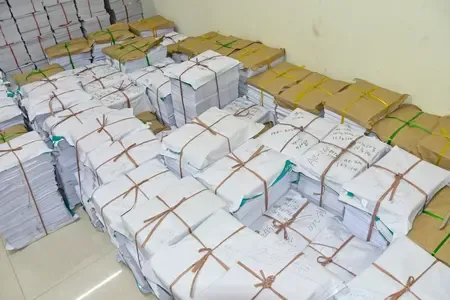What Concerns Arise from the Taliban's Suspension of Trade with Pakistan?

Synopsis
Key Takeaways
- Taliban suspends trade ties with Pakistan
- Major economic concerns for Khyber Pakhtunkhwa
- Local industries heavily reliant on Afghan exports
- Urgent calls for alternative trading routes
- Potential job losses and bankruptcies
Kabul, Nov 14 (NationPress) The Taliban's recent declaration regarding the halt of trade relations with Pakistan has raised alarm among traders and customs agents in Khyber Pakhtunkhwa, as they anticipate significant economic fallout for the local commerce sector, according to local media.
In response to this announcement, Ziaul Haq Sarhadi, Senior Vice-President of the Pak-Afghan Joint Chamber of Commerce and Industry, voiced his concerns that Pakistan may forfeit a substantial market in Afghanistan and the Central Asian nations, with which Pakistan has recently formed trade agreements, as reported by Pakistan's premier daily, Dawn.
Sarhadi highlighted that Pakistan has been exporting a variety of products including fresh fruits, cement, pharmaceuticals, surgical supplies, agricultural equipment, textiles, footwear, cosmetics, sanitary items, plastic pipes, and numerous other locally produced goods, valued at approximately USD 100-200 million monthly to Afghanistan.
“We are at a disadvantage due to the closure of our borders with Afghanistan, as Kabul has numerous alternatives compared to us,” he remarked.
Zahidullah Shinwari, a former president of the Sarhad Chamber of Commerce and Industry, indicated that the disruption of trade with Afghanistan would severely impact the tax revenues of the Federal Bureau of Revenue, which typically collects millions of rupees from daily import and export activities at all border crossings. He noted that the industry in Khyber Pakhtunkhwa would be particularly affected, given its heavy reliance on Afghanistan for its products.
“A large portion of our significant industries, especially cement plants, depend on coal imported from Afghanistan, so halting coal imports will negatively influence the production capacity of these major industries,” he explained.
He cautioned that a permanent trade halt with Afghanistan could result in the closure of many industrial units in Khyber Pakhtunkhwa, leading to widespread job losses and potential bankruptcies among business owners, as per the Dawn report.
Earlier reports suggested that Afghanistan has urged its business community to cease importing medicines from Pakistan within three months, claiming they are of inferior quality, and has emphasized the need for traders to explore alternative trading routes instead of depending on Islamabad.
Mullah Abdul Ghani Baradar, Afghanistan's Deputy Prime Minister for Economic Affairs, has issued a warning that following this notice, Kabul will not engage with or heed traders who persist in doing business with Pakistan, as reported by Tolo News on Wednesday.
“Our health sector struggles primarily due to the import of substandard medications from Pakistan. I strongly urge all medicine importers to immediately seek alternative supply channels. Those with contracts or purchases in Pakistan have three months to finalize their transactions and conclude their operations,” quoted Baradar.
The Taliban leader proposed several critical recommendations concerning the protection and sustainability of national trade during a meeting with Afghanistan's business community.
Reports indicate that trade routes between Afghanistan and Pakistan have been closed for approximately a month, leading to significant fluctuations and unprecedented price increases in markets across both nations.









